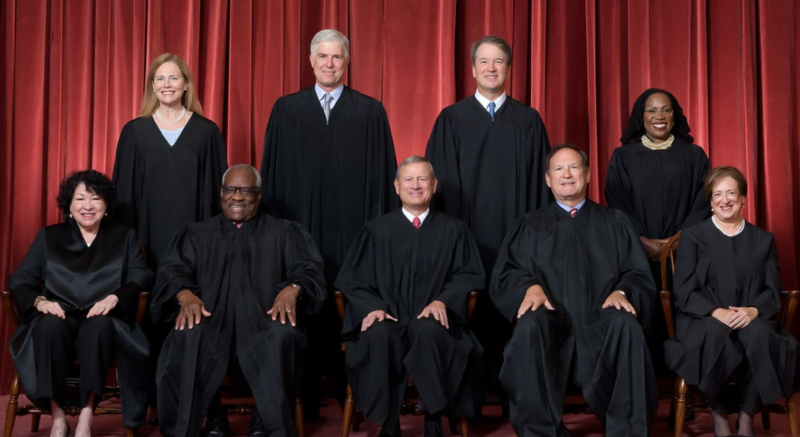Category Archive: 6b.) Mises.org
Conservatives Shouldn’t Assume the Supreme Court Will Save Trump
This week’s decision by the Colorado Supreme Court to ban — for now — Donald Trump from the state’s presidential ballot is the latest escalation in the broader theatre of deteriorating political norms in America. The four-three decision is grounded in the Court’s opinion that Trump’s actions on January 6 represent culpability in an attempted “insurrection” and therefore disqualify him under the Fourteenth Amendment.
The response to the court’s...
Read More »
Read More »
The First Enemies of Free Markets Were Conservatives, Not Socialists
British conservative critics of industrialization invented new terms like "wage slavery," "factory slavery," and "white slavery." Much of the conservatives' terminology and their arguments would later be adopted by socialists.
Original Article: The First Enemies of Free Markets Were Conservatives, Not Socialists
Read More »
Read More »
Let them Merge: Foreign Acquisition of US Steel
Economic nationalists are once again fawning over Democratic US senator John Fetterman from Pennsylvania. First it was for his opposition to Chinese-owned US farmland. Now he is opposing the acquisition of United States Steel Corporation (US Steel) by a Japanese company. This acquisition, however, should not be blocked. It should be embraced. The justifications for government intervention are not convincing.
News broke Monday, December 18, that...
Read More »
Read More »
Does Anyone Know What the Fed Is Doing?
On this episode of Radio Rothbard, Ryan McMaken and Tho Bishop are joined by Mark Thornton to discuss Jerome Powell's most recent announcement. As the Fed signals its potential for a policy pivot, other members of the FOMC are sending other signals. What does this mean for monetary policy, the dollar, and the performance of the real economy? Thornton is here to answer these questions and more.
"Will Powell's Pivot Bail Out...
Read More »
Read More »
The Fed-Enabled Apartment Bubble Is Unraveling
Thanks to Federal Reserve intervention, apartments and apartment buildings have turned into giant malinvestments. Once again, a federal entity intervenes in markets presumably to make them work better, but things end in a crisis.
Original Article: The Fed-Enabled Apartment Bubble Is Unraveling
Read More »
Read More »
Do Destroyed Monuments Represent a Past Not Worth Defending?
The wonderful thing about liberty, property rights, and markets is that if you don’t like something, you don’t have to be a part of it. Under pure and beautiful capitalism, consumers are sovereign: they’re not forced to consume something, and their value creation isn’t expropriated to finance what someone else thinks is important.
A liberal order based on individual property rights thus becomes a conflict-minimizing system in that we can leave one...
Read More »
Read More »
Virtual Mises University 2024
Join 2024's Virtual Mises University for only $45—or join free for Mises Institute Members (use your promo code on the back of your Membership card).
For almost thirty years, Mises Institute scholars have presented at Mises University, a world-class, week-long, intensive event in Austrian Economics. Virtual Mises University is the online component of this seminar for students, professionals, business people, and absolutely anyone, anywhere, who is...
Read More »
Read More »
Rothbard and Mises vs. Calhoun on the Natural Right to Secede
There are many reasons to support the breaking up states into smaller pieces. This is done via secession, and acts of secession produce smaller states. All else being equal, smaller states tend to be richer and they tend to have lower taxes. They tend to exercise less power over the resident population—because it's easier for people to escape smaller states than larger ones. Moreover, setting these tangible and practical considerations aside,...
Read More »
Read More »
Our Friend the State
Economics in America: An Immigrant Economist Explores the Land of Inequalityby Angus DeatonPrinceton University Press, 2023; xiii + 273 pp.
Economics in America disappointed me, but I have only myself to blame. As you would expect from a Nobel laureate, Angus Deaton is very smart and erudite, but what you might not expect is that he is funny as well. The book contains much good sense, but it is quite unsympathetic to the free market. And this is...
Read More »
Read More »
What, Me Normative?
Visions of Inequality: From the French Revolution to the End of the Cold Warby Branko MilanovicHarvard Univerity Press, 2023; 359 pp.
Branko Milanovic’s Visions of Inequality contains one of the most misleading statements I have ever encountered by an author about the contents of his own book. Milanovic, an eminent economist who teaches at the City University of New York and was formerly the lead economist at the World Bank, addresses in this book...
Read More »
Read More »
Friedman versus Rothbard
Murray Rothbard and Milton Friedman didn’t only disagree on the subject of economics. They also sharply disagreed on the direction American conservatism needed to go.
Original Article: Friedman versus Rothbard
Read More »
Read More »
Selections from The End of the Dollar Era
Government-Managed Digital Currency: A Further Threat to Our Freedom
by Paul Gottfried
Whatever the modern self-described liberal democratic administrative state claims to be doing in the name of disadvantaged people is intended primarily and perhaps exclusively to increase government control. Further, whenever the same regime purports to be making our lives more comfortable, more agreeable, we may assume that our freedom and property rights are...
Read More »
Read More »
The Wrong Way and the Right Way to Fix the Fed
Monetary Policy as Inflationism
Today all governments and central banks operate under the ideology of inflationism. The underlying principle of inflationism is that the quantity and purchasing power of money determined by the free market leads to deflation, recession, and unemployment in the economy. The inflationist ideology is therefore embedded in the very concept of monetary policy, which can be defined as an increase in the supply of money...
Read More »
Read More »
From the Editor—November/December 2023
The Mises Institute is different. We don’t change our positions or our ideology to match the current zeitgeist. Rather, we’re in it for the long haul. Our business is to change the minds of both scholars and the general public. Victory in the battle of ideas doesn’t begin in legislative committee rooms. It begins in classrooms and living rooms.
To achieve this goal, it’s important to not sacrifice consistency to score some short-term and fleeting...
Read More »
Read More »
Does Debt Make Capitalism Financially Unstable?
According to the post-Keynesian School of Economics economist Hyman Minsky, the capitalist economy has an inherent tendency to develop instability that culminates in a severe economic crisis. The key mechanism that pushes the economy toward a crisis is the accumulation of debt.
According to Minsky, during “good” times businesses in profitable sectors of the economy are rewarded for increasing their debt levels. The more one borrows, the more profit...
Read More »
Read More »
Year-End Foreign Policy Predictions
Ryan and Zachary make some guesses about where things are headed in 2024 for both Ukraine and the Israel-Hamas war. How long will the US try to keep the Ukraine war going, and what is Israel's plan for Gaza?
Be sure to follow War, Economy, and State at Mises.org/WES.
Read More »
Read More »
The Path to True Freedom is Systematic Privatization
Anarchocapitalism does not fall into the same category as socialism, whose establishment and maintenance require violence. Anarchocapitalism arises spontaneously from the removal of barriers that stand against the natural order of things.
Original Article: The Path to True Freedom is Systematic Privatization
Read More »
Read More »
The Dishonesty of the New York Times Revealed
Last May, the chairman and publisher of the New York Times, A.G. Sulzberger, wrote a twelve-thousand-word feature in the Columbia Journalism Review appealing to the importance of independent journalism and framing the Times as a news organization committed to this ideal.
Sulzberger defines his model of independent journalism, writing that it “elevates values grounded in humility—fairness, impartiality, and (to use perhaps the most fraught and...
Read More »
Read More »
Tucker Carlson is Not Entirely Wrong About “Libertarian Economics”
Tucker Carlson, who recently announced his own new media network, has been making the podcast rounds, talking to hosts of a variety of different ideological backgrounds. An interview a few weeks ago with Dave Smith had a moment that went viral when both men proclaimed Bill Buckley as a great villain of the 20th Century. (Murray Rothbard would agree.) Recently a new clip with Glenn Greenwald made the social media rounds with Carlson claiming that...
Read More »
Read More »
X Marks the Spot: Social Media’s Last Stand
Ever since Elon Musk acquired Twitter, now X, the censorship regime has been hell-bent on harassing the company and Musk himself—with bad publicity, accusations of antisemitism, and advertiser boycotts. Musk struck back by threatening to sue the Anti-Defamation League, suing Media Matters for defamation, and famously telling fleeing advertisers “Go f*ck yourself.”
Musk’s X has the potential to weaken the Big Digital woke cartel, which censors...
Read More »
Read More »



























